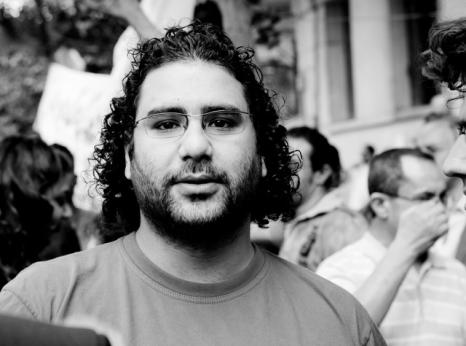Egypt: Egyptian-British Activist Still Unjustly Jailed

Alaa Abdel Fattah, a well-known political activist and government critic, has been repeatedly arrested in the past decade including for his role in the 2011 uprising. Mohamed Baker is a human rights lawyer and director of Adalah Center for Rights and Freedoms, which he founded in 2014. Mohamed Baker and Alaa Abdel Fattah were arrested on 29 September 2019 and ordered into pre-trial detention pending investigations into bogus terrorism-related charges under Case No.1356/2019 of the Supreme State Security Prosecution (SSSP), a branch of the Public Prosecution specialized in investigating national security threats. The SSSP opened investigations into similar charges against them under new Case No. 1228/2021 as part of a strategy increasingly used by the authorities, referred to as "rotation", to circumvent the two-year limit for pre-trial detention allowed under Egyptian law and to indefinitely extend the detention of activists. Their trial in Case No. 1228/2021 started on 28 October 2021, together with another defendant: blogger and activist Mohamed Ibrahim Radwan “Oxygen”, who was also convicted on charges of “spreading false news” in relation to social media posts and sentenced to four years’ imprisonment. Proceedings before emergency courts are inherently unfair as their verdicts are not subject to appeal by a higher tribunal. Defence lawyers were prevented from communicating with defendants in private and photocopying the casefiles and indictments. On 3 January 2022, the president ratified the verdict against all three. A document seen by Amnesty International indicated that the sentence commenced from the date of ratification, rather than from the date of their arrests.
Alaa Abdel Fattah and Mohamed Baker were held in inhumane conditions at the Tora Maximum Security 2 Prison, in Cairo from September 2019 to May and October 2022, respectively. Prison authorities held them in small, poorly ventilated cells and have denied them beds and mattresses. The prison authorities also denied them reading materials, exercise in the prison yard, adequate clothing, radios, watches, access to hot water and any personal belongings, including family photos. On 12 May 2022, Alaa Abdel Fattah told his mother that he was beaten while handcuffed by the deputy prison warden at Tora Maximum Security 2 prison. On 18 May 2022, he was transferred to Wadi al-Natrun Prison after significant public pressure. On 2 October 2022, Mohamed Baker was transferred to Badr 1 prison, where prisoners complain about being under constant camera surveillance and bombarded with fluorescent lights. On 10 April 2023, authorities in Badr 1 prison stripped, beat and otherwise abused Mohamed Baker and subsequently placed him in solitary confinement. Authorities also arbitrary arrested Neama Hisham, Mohamed Baker’s wife, on 17 April and held her for some 13 hours, after she reported on his assault.
Since the President’s reactivation of the Presidential Pardons Committee in April 2022, the Egyptian authorities released high-profile prisoners of conscience and hundreds of others held for political reasons. However, thousands remain arbitrarily detained solely for exercising their human rights, or following grossly unfair trials, or without legal basis. Before the UN Climate Change Conference (COP27), hundreds were arrested and ordered into pre-detention pending investigations in connection to their calls for peaceful protests on 11 November. During COP27, a chorus of voices called on the Egyptian authorities to release Alaa Abdel Fattah who was on hunger strike for seven months when the event started on 6 November 2022. For instance, on 8 November, expressing deep regret at his ongoing detention, UN High Commissioner for Human Rights, Volker Türk, called for his immediate release and urged the authorities to provide him with the necessary healthcare. Alaa Abdel Fattah began his hunger strike on 2 April 2022 to protest his unjust imprisonment and denial of consular visits. On 1 November 2022, he escalated his hunger strike and stopped consuming the 100 calories he had been consuming since April and on 6 November 2022 he stopped drinking water. On 11 November 2022, Alaa Abdel Fattah lost consciousness in the shower, and when he regained it, he was held by a cellmate, surrounded by a large crowd and had a tube inserted into his body. Following this near-death experience, he decided not to resume his hunger strike immediately, but vowed to continue if “there continues to be no real movement on his case”.
On 24 March 2023, the UN Human Rights Committee published its concluding observations on Egypt’s compliance with its obligations under the International Covenant on Civil and Political Rights highlighting several issues raised since 2013 by Amnesty International and other Egyptian and international human rights groups, including arbitrary detention and abuse of counterterrorism legislation to silence actual or perceived critics of the Egyptian authorities.